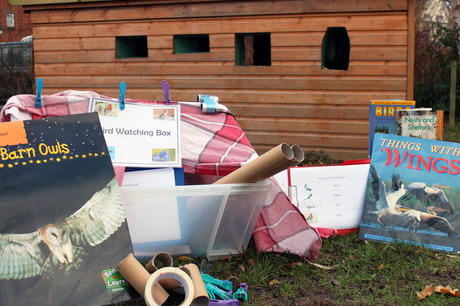
At Everton Nursery School and Family Centre, we noticed our children had a particular interest in taking our indoor role-play resources outside in order to extend their imaginative play. However, we found that resources were being damaged or lost as a result. To tackle the problem, and maintain the quality of our indoor provision, we developed a range of high-quality outdoor role-play boxes in order to develop and enrich children’s interests.
All our staff and children had the opportunity to contribute ideas and provide resources for each box – these were taken from observations of children’s play and their individual Possible Lines of Direction (PLOD) plan. The first set of boxes included resources linked to children’s interests in construction, garages and a car/bike wash.
When the boxes were first introduced, children responded positively to the new resources and experiences, with staff noting that children’s levels of involvement increased. Boys who would normally flit from one area to another when outdoors, or who would be constantly engaged in ‘superhero play’, became engrossed in the boxes. Our senior staff also observed closer interactions between staff and children when engaged in play linked to the role-play boxes.
These observations were fed back to the leadership team at one of our self-evaluation meetings, where it was decided to make the boxes part of our development plan to enhance adult engagement and child involvement outdoors.
Vivian Gussin Paley in A Child’s Work: The Importance of Fantasy Play talks about the importance of linking children’s imaginative play to their current interests, and our children’s enhanced involvement outdoors showed this to be true.
In response, we developed a wider range of boxes linked to children’s interests, including ones on roles within a sandwich bar/café, fishing and bird-watching (see box).
Soon the boxes became an integral part of outdoor provision, with staff setting out a different box each day or week depending on the children’s interests – and beginning to consider a wider range of resources when buying outdoor equipment.
OUTDOOR MATHS
At Everton, we firmly believe that ‘maths is not only taught because it is useful… it should be a source of delight and wonder, offering pupils intellectual excitement’ (Montague-Smith and Price, 2002, Mathematics in Nursery Education).
So, as part of my performance management objectives, I was set the task of exploring how to use the concept of a role-play box to enhance children’s mathematical learning experiences. Working with our mathematics co-ordinator, we presented ideas at a planning and evaluation meeting and decided to introduce each box to children during family worker (small group) times.
This gave staff the opportunity to observe the children exploring each box and to assess the type of mathematical learning that could be added to the experience and the best way to introduce it. Staff then shared their ideas at weekly planning meetings, enabling me to develop mathematical activities for each box, one at time.
After exploring our ‘washing day’ box and sharing ideas as a team, we decided to add socks to our list of resources. This simple addition enabled staff and children to explore size, pattern, colour, sorting and matching. The learning experience proved so successful that children extended their interest in patterns indoors and we created a pattern display.
We added a range of mark-making resources to our football box to encourage children to ‘write’ their scores. This was another very successful addition as it enhanced boys’ mark-making skills and enabled them to represent numbers or the amount of goals scored in a meaningful context.
We must acknowledge the work of Vivian Gussin Paley, in which she suggests that, ‘fantasy play is the glue that binds together other pursuits, including the early teaching of reading and writing skills’.
As an additional part of my performance management objective, I tracked a small group of boys to observe and document their mathematical progress throughout the academic year. To do so, I undertook a baseline assessment and monitored their progress through observations and assessment throughout the year. To track and record the children’s levels of involvement, I used the Effective Early Learning (EEL) self-evaluation tool.
Observations noted in the autumn term demonstrated low levels of involvement, scoring only 1 or 2 on the EEL scale. These observations showed ‘little’, ‘interrupted’ and/or ‘no involvement’ in their play outdoors. However, when the outdoor boxes were introduced, observations of the children’s play began to show higher levels of involvement, scoring 3, 4 and even reaching 5 on the EEL scale.
Straight away, the boys’ involvement and concentration outdoors improved, with observations noting that they were able to sustain and engage in more intense, adult-led learning experiences over extended periods of time. This positive effect enabled the boys to reach significant milestones in their development that they would not have reached in an indoor learning environment.
When reviewing this group of children’s end of nursery assessments, it was clear that the outdoor boxes had made a significant contribution to their learning. Written observations and photographs provided clear evidence of their progress – not just in mathematics, but very much cross-curricular.

BIRD-WATCHING BOX
A bird-watching box is one of the many outdoor role-play boxes that we have created. It stemmed from a particular child’s interest in bird-watching and was created as part of their PLOD.
Within the box, we provided resources for building a hide such as fabric, pegs and string as well as binoculars, notepads and mark-making utensils.
When assessing the outcomes that may develop from the experience, staff discussed how children’s use of positional language might be extended while building the hide then bird-watching from within.
Everton’s resource boxes will feature in our new 4pp activity pullouts, starting in the next issue on 25 January.









